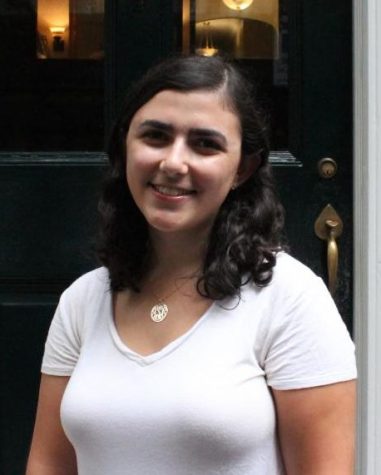Junior Year Talmud Paper
This year, a new addition has been made to the junior year Talmud curriculum: a Judaic studies paper. After selecting a topic relating to Halacha, Talmud, or Tanach, juniors conducted research and developed a thesis, which they then proved in their papers. Students’ topics included kitniyot on Pesach, the obligation of shomer negiah, the customs of baalei teshuva, human superiority over animals, the halachic status of Israel’s government, and many others. A fair amount of creative freedom was extended to each student, enabling him or her to tailor the paper to fit his or her specific interests.
According to Rabbi Schiowitz, who serves as Chairman of Judaic Studies at Ramaz, the goal of the paper is twofold. Firstly, it is part of an effort to integrate more writing into the overall school curriculum. (As a parallel initiative, sophomore students are now required to write a Dvar Torah in their Talmud classes). Secondly, the paper aims to allow “more individual initiative in learning,” said Rabbi Schiowitz. Generally speaking, the goal of the paper, according to Rabbi Schiowitz, is to help students become “more sophisticated in [their] learning, [rather] than just respond to questions on a test.”
Overall, many juniors appreciate the opportunity to write such a paper, seeing it as an opportunity to investigate topics that they are passionate about. “I think most of us have religious topics that we wonder about, and this is a good forum for researching them,” said Daniella Feingold ‘20. “I found my research very beneficial to the way I observe Jewish law,” said Sophia Kremer ‘20, who wrote a paper arguing that Jews who visit Israel during the Shalosh Regalim must observe two days of Yom Tov, rather than the single day traditionally observed in Israel. The paper “allows us to blend our Judaic and general studies skills in ways we haven’t necessarily been granted the opportunity,” said Elizabeth Newman-Corré ‘20.
Other students believe that adding work to the Talmud curriculum deducts from the students’ secular learning. “The school is focusing way more on Talmud than they are on the secular subjects,” said Rina Marlowe ’20. “We’re told to channel more of our effort into Talmud than we are into our history paper.” Marlowe’s stressful sentiments, which she shares with many members of her grade, was magnified by the fact that a historiography assignment for the Junior history paper was due the same week as the final draft of the Talmud paper, forcing students to decide which to prioritize over the weekend before the dual due date.
There is a consensus among the class of 2020 that adding the paper to the junior year curricular specifically was a mistake. “Our year is hectic already, with ACT/SAT prep, tests, assignments and on top of that a history paper as well,” said Rachel Guidanian ’20. “I just don’t think it was a good idea to incorporate it this year.” An anonymous student described the addition as “another sadistic method of torturing us this year.” Elizabeth Newman-Corré explained that “Instead of the Talmud paper being viewed as an opportunity to expand our minds, [the stress of junior year has made it] another box to check with as little effort as possible, which is unfortunate because it has so much potential.” Rabbi Schiowitz suggested that juniors might have felt overwhelmed by the paper because they were surprised by it. Indeed, juniors have never had to write a Talmud paper before. “Before you start, it’s overwhelming” he concluded, but “you have to assess it after it’s finished.”
Students made suggestions about how to improve the paper in future years. “It should really be given as extra credit, considering the amount of work we already have,” said James Auerbach ‘20. Rina Marlowe ‘20 explained that many students had trouble choosing a topic. She suggested that students should be required to “have an individual meeting for a whole period with their teacher to come up with ideas and find something that’s interesting to them. There’s no point of doing the paper if it’s not something that you are actually interested in doing.” Additionally, Rabbi Schiowitz suggested that in future years, students will ideally be given more help with the research component of the paper, given that many students seemed to struggle with it more than he has previously expected.
For most of the junior class, the Talmud paper was due the week before winter break. However, two classes Talmud classes (Rabbi Stochel’s honors class and Rabbi Sklarin’s general class) had their deadlines extended and don’t yet have a due date. “It’s better that we’re not on same schedule because our paper has a more flexible deadline,” said Ben Silverman ‘20, a student in Rabbi Stochel’s class. Rina Marlowe ‘20, also in Rabbi Stochel’s class, disagrees, stating, “I think it’s unfair to the honors kids because they’re going to have to cram the paper in a shorter amount of time. I also think it’s unfair to assign a paper to the honors kids at all because it’s just so much more work than the other classes, and so much harder.” According to Ethan Morali ‘20, a student in Rabbi Sklarin’s class, the extended due date “made life easier,” allowing him and his fellow classmates “to focus on other subjects.” Morali went on to say that the extended due date granted him “much more time compared to [his friends] who actually had to write the paper [by a specific deadline].”
The junior class presidents sent a poll to the junior class about the Talmud paper. Of the 25 students who responded, 48% of their classes had their class’s due date extended and haven’t written their paper yet. 20% said that they spent about two hours on their paper, 20% spent two to five hours, 3.5% spent 1 hour or class, 3.5% spent 5-10 hours, and 4% didn’t write it.
Overall, many students are excited about the opportunity to expand their Judaic studies knowledge by writing a research paper. However, many classes haven’t yet written their papers, and most juniors resent the additional work. Indeed, adding another time-consuming assignment to the already packed junior year course load was bound to be met with backlash. In future years, if the Talmud department wishes to keep its Talmud paper, it will need to work with the student body in order to ensure that writing such a paper is manageable and practical.

Josephine Schizer has been writing for the Rampage since her freshman year and is excited to be serving as Co-Editor-in-Chief. Outside of Rampage, Josephine...



